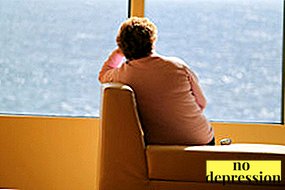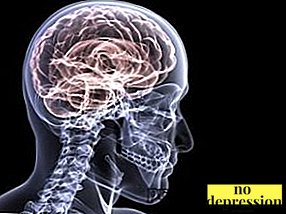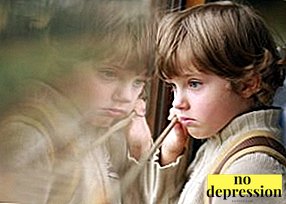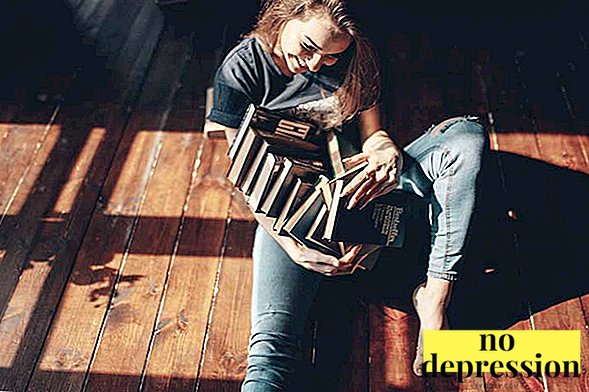Often the person experiencing serious psychological problems, ignores and tries to hide them. He does not even suspect that his serious condition may indicate the presence of depression.
In the end, without proper treatment of his state of health deteriorates, and often such stories end in tragedy. In this article, we consider this type of this disorder, such as atypical depression, and how to treat it.
Definition and characterization

Atypical depression - a psycho-emotional discharge from the disease, in which there are mild symptoms of typical depression and other specific ones.
Unlike standard depression, it differs in the patient's elevated emotional background. It usually flows frequent short episodes.
The reasons
The disease is quite common. At the same time, the exact reasons for its occurrence are still unknown, and there is no clear forecast. Different specialists have different opinions about the course of the disease.
Doctors believe that in most cases it is not diagnosed. In this regard, there are certain difficulties in identifying atypical depression and drawing up a course of treatment.
However, scientists can name risk factors that increase the likelihood of atypical depression.
Biological factors
TO biological factors relate:
 Disorders of chemical reactions in the brain, hormones responsible for bright emotional states: serotonin (the hormone of happiness), norepinephrine (the hormone of aggression), dopamine (responsible for love and love, motivation, passion for life).
Disorders of chemical reactions in the brain, hormones responsible for bright emotional states: serotonin (the hormone of happiness), norepinephrine (the hormone of aggression), dopamine (responsible for love and love, motivation, passion for life).- Heredity - the chance of occurrence of a depressive disorder increases, if it was from someone in the family.
- Taking narcotic drugs or other, but having a similar effect: steroids, painkillers, etc.
- Hormonal imbalance.
- Viral or infectious diseases of the brain.
- Chronic or long-lasting diseases, in particular, oncological.
- Maintaining an unhealthy lifestyle: alcoholism, smoking, use of narcotic substances.
Psychological factors
Apathetic depression may also occur due to the following psychological problems:
- Emotional instability of the personality, its individual susceptibility to external factors.
- Constant and frequent stress, experienced difficult situations (divorce, death of a loved one, etc.).
- Having constant excitement, fear, or a sense of insecurity.
- The arising need for attention from the side or help that the individual did not need before (for example, a disability).
 Child and adolescent emotional trauma (experienced violence, etc.).
Child and adolescent emotional trauma (experienced violence, etc.).- Conflicts or injuries as a result of which the patient develops an inferiority complex or guilt complex.
- Self-isolation or forced lack of contact with society.
Risk group
AT main risk group includes people who have experienced the classic form of depression at a young age, as well as those who are eligible for the factors listed above.
Teenagers and young people are most susceptible to her, most often women are affected.
Symptoms and signs
Because this kind of depression has special propertiesIt is difficult to recognize it immediately. But there are certain external manifestations, in the presence of which one should consult a doctor.
Here are some of them:
- mood swings;
- sadness, depressed state, frequent desire to cry;
- work or other favorite activities do not bring joy;
- problems with attention;
- irritability;
- difficult to control their actions;
- excess night sleep and high daytime sleepiness;
- increased appetite;
- suicidal thoughts.

All criteria need not be present, as the disease is very individual.
Timely diagnosis and treatment is very important, because without help a depressed person can not only ruin his life, but also reach suicide.
Diagnostics
Diagnosis of atypical depression is carried out attending psychiatrist.
Although atypical depression has the symptoms of a common depressive disorder, it is very different. This disease has a number of specific manifestations.
According to ICD-10, a diagnosis is made when a patient has at least two of them, and at the same time he manifests emotional reactivity.
Emotional reactivity - This is the official name of the usual manifestation of emotions and feelings, but more vivid than most people. With ordinary depression, the sensitivity is dulled, the patient practically does not react to the world around.
But in the case of atypical depression it emotional susceptibility persists and even escalates. In simple words, a person begins to more acutely experience minor events, to respond brighter and stronger to everyday situations.
If this criterion is present, the physician should look to see if some of the characteristic symptoms for atypical depression:
- increased appetite;
- rapid weight gain;
- constant drowsiness;
- feeling of heaviness in the legs;
- decrease in sexual activity;
- there may be other persistent pains - migraines, etc .;
- vivid emotionality, strong reaction to external stimuli;
- problems in relations with society and with relatives, a serious decline in social activity - as a result of emotional reactivity.

For an accurate diagnosis, the doctor must also take tests for hormone levels.
Treatment methods
When diagnosing a disorder, doctors prescribe to a patient. individual treatment.
As a rule, it consists of psychological assistance and treatment with antidepressants.
Medicines
In the case of apathetic depression, experts prescribe antidepressants MAOI (monoamine oxidase inhibitors). These substances are divided into:
- non-selective irreversible - improving the general condition of people with depression;
- selective reversible - have antidepressant effects, psychologically energize with energy, stabilize the work of serotonin and norepinephrine;
- selective irreversible - have a positive effect on dopamine.

For each group there is a specific list of antidepressants.
The effect of their treatment comes in about 2-3 weeks of the course.
TO non-selective irreversible drugs include:
- Fenelzin.
- Iproniazid.
- "Isocarboxazid".
- Nialamide.
- Tranylcypromine.
TO selective reversible is ranked:
- Metralindol.
- "Pirlindol".
- Befol.
- "Moclobemide."
- Beta-carboline derivatives.
By selective irreversible applies means "Selegin."
Treatment with these medicines should be carried out under the strict supervision of a physician. They have toxic properties and contraindications.
Psychological help

The peculiarity of apathetic depression also lies in the fact that its course is strongly depends on the emotional state of the patient.
People with apathetic depression react to any external stimuli.
Usually they are very perceive painfully even a slightly unfriendly attitude, vulnerable, unsure of themselves.
In this case, any happy event immediately improves their condition. Accordingly, the main goal of the attending physician is to give the patient enough attention and help cope with negative perceptions.
The main recommendations for psychological assistance (not only the doctor, but also close people) are as follows:
- Understanding. A person must feel that he has the right to sadness and depressed mood. No need to condemn him, give obsessive advice or "dig" in it.
- Optimism. People with depression, not only apathetic, perceive the world around them in a negative light. Therefore, the best option would be unobtrusively show him the bright side of life and himself.
- Self-confidence instilled. It is very important to show a person with atypical depression that he has abilities, talents, good sides. He is lucky and there are things that he does well.
- Help in everyday affairs. Sometimes it is very difficult for a person with depression to do simple things (cooking, cleaning). Therefore, from the side of close people it will be right to help the patient - this will improve his condition and give the feeling that he is important to others.
- Do not respond to aggression. Due to illness, a person can be broken off by anger, insults and other manifestations of aggression. They are not to blame - this is a consequence of depression. In this case, it is better to avoid topics unpleasant for the patient, and caustic conversations should be reduced to neutral and pleasant topics.
Friendly support and understanding can be brought out of such a difficult and dangerous condition as depression.
The sick should turn to a psychotherapist for professional helpand also to feel comfort in a circle of close people.
Practical recommendations

Taking prescribed antidepressants MAOI, a person should follow a strict diet.
The diet is also prescribed by the attending physician depending on the prescribed medications.
But usually you should consume less carbohydrates and fats, as well as refuse to eat foods rich in tyramine. Products containing it include:
- cheeses;
- smoked meat (pepperoni, salami, etc.);
- food with broken storage rules;
- beans, coffee, chocolate;
- foods that contain yeast;
- beer, red wine;
- other dishes that include food rich in tyramine.
Also, when taking medication is recommended to use and folk remedies. The most popular are:
- ginseng root;
- Rhodiola Rosea;
- rapontikum;
- Chinese lemongrass;
- Eleutherococcus;
- zamaniha;
- rosemary;
- gentian.
These means, as a rule, facilitate the general condition of the patient and improve his state of health.
Prevention and prognosis

With timely access to a specialist, compliance with the recommendations and assistance from relatives there is a high chance of healing and returning to normal.
As a preventive measure, it is enough to lead a healthy, measured lifestyle.
Follow the regime and eat well, do not create bad habits and monitor their psychological state.
If you experience stress or other instability you should not accumulate negative emotions, it is better to immediately seek the help of specialists. In the presence of symptoms of disorders immediately go to the doctor.
Remember that your psychological health is important as much physical. A person is not to blame for his depression, and this disease does not make him "weak." Do not be afraid to ask for help if you or your loved ones consider it necessary.
About the diagnosis of "atypical depression" in this video:

 Disorders of chemical reactions in the brain, hormones responsible for bright emotional states: serotonin (the hormone of happiness), norepinephrine (the hormone of aggression), dopamine (responsible for love and love, motivation, passion for life).
Disorders of chemical reactions in the brain, hormones responsible for bright emotional states: serotonin (the hormone of happiness), norepinephrine (the hormone of aggression), dopamine (responsible for love and love, motivation, passion for life). Child and adolescent emotional trauma (experienced violence, etc.).
Child and adolescent emotional trauma (experienced violence, etc.).

